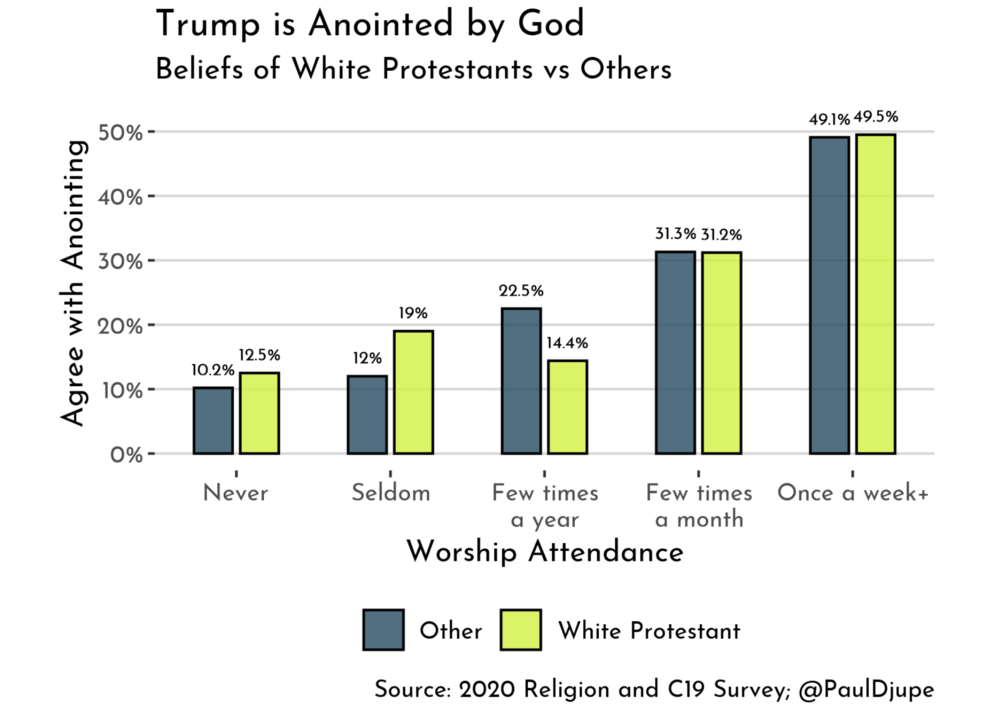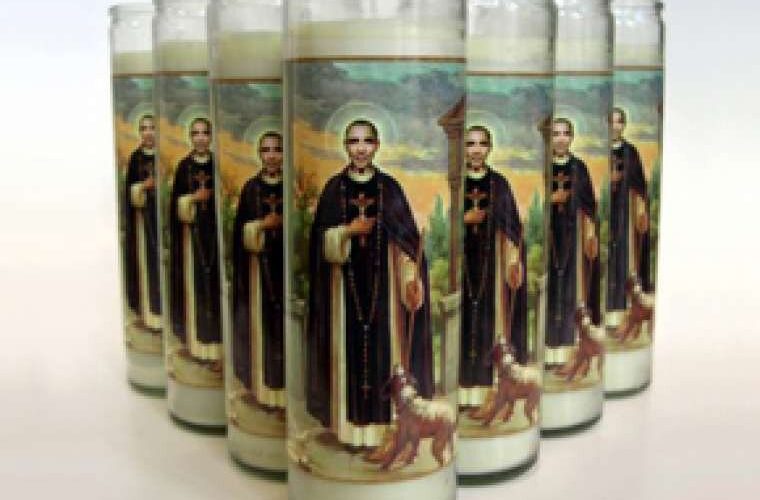Here’s the graph in question by the incomparable @PaulDjupe. It’s notable how only a third of white Protestants who attend church weekly thought that ALL presidents were anointed by God in 2020. pic.twitter.com/Ajo9wSezVp
— Ryan Burge 📊 (@ryanburge) June 21, 2020
Maybe something strange leaked into the American water system a dozen years or so.
I am not a Republican, so I wasn’t part of the choir that sang the praises of Ronald Reagan. I do remember that journalists and historians were nervous about Reagan referring to America as an “anointed” land (example here). However, I don’t remember his followers using similar “anointing” language to describe the president. Ditto for George W. Bush.
I do remember (I was still a Democrat at the time) the wave of interesting semi-religious images and language in press coverage of the young Sen. Barack Obama as he started his bid for the White House. Folks who have been around will remember the online feature — “The Obama Messiah Watch” — that Timothy Noah launched at Slate. Here is the overture for the first post in that series:
Is Barack Obama — junior U.S. senator from Illinois, best-selling author, Harvard Law Review editor, Men’s Vogue cover model, and “exploratory” presidential candidate — the second coming of our Savior and our Redeemer, Prince of Peace and King of Kings, Jesus Christ? His press coverage suggests we can’t dismiss this possibility out of hand. I therefore inaugurate the Obama Messiah Watch, which will periodically highlight gratuitously adoring biographical details that appear in newspaper, television, and magazine profiles of this otherworldly presence in our midst. …
Readers are invited to submit … details — Obama walking on water, Obama sating the hunger of 5,000 with five loaves and two fishes — from other Obama profiles.
I bring this up to point readers to an interesting feature entitled “Trump The Anointed?” at the Religion In Public blog — written by Paul A. Djupe and GetReligion contributor Ryan P. Burge.

Here is how that post opens, referring to people who — in polling nearly a year ago — believed that Donald Trump was “anointed by God to be president of the United States”:
Just 21% believed this, but evangelicals were more likely to believe it (29%), and pentecostals were the most likely (53%). This belief didn’t come out of nowhere, it was making the rounds of conservative media, with figures such as Rick Perry suggesting that Trump is “the chosen one,” a label Trump embraced and used (while pointing toward the clouds) in an August 2019 presser. Others used variations on the theme; he was compared to King Cyrus; “God was behind the last election;” and Trump is the “King of Israel,” and the “second coming” according to Wayne Allen Root.
Now, there is a theological point that needs to be made here. Many believers may use the word “anointed” as a way of saying “chosen” by God — as opposed to meaning “anointed” in the sense of God giving a person unique spiritual gifts.
At that point, it’s crucial to try to find the line between people who (a) believe that leaders of a nation — take the Queen of England, for example — are chosen by God and somehow part of God’s plan for history and (b) those who believe that Trump (or Obama, in the past) has been given a unique level of “anointing” by God.
Thus, note this other passage from Djupe and Burge:
Notably, believing that all presidents were anointed also increased over the past year and in just as dramatic of fashion. It is also clear that there remains a gap in believing that all presidents are anointed versus whether Trump was, though it is now much smaller. In 2019, the gap was nearly 40% across attendance categories, though by 2020 the gap was closer to 15%. The religious significance of the presidency is spreading.
Before we isolate this as a phenomenon of white Protestants, we should compare them to the rest of the sample in 2020. The figure below shows unequivocally that white Protestants are NOT distinctive in their beliefs in Trump’s anointing. In the top two attendance categories, the level of belief is effectively identical between the two groups. This is a phenomenon that is sweeping American religion.
Here is that chart:

Interesting material here, whether one agrees with all of the interpretation or not.
I also believe that this topic is linked to the tensions inside evangelicalism between those who have enthusiastically supported Trump (think primary voting in 2016), as opposed to those who reluctantly supported him in the general election.
That leads us to this next Burge Chart about a topic that news consumers will be seeing more about in the near future, methinks.
I have actual data about white evangelicals vote preference in the 2020 election.
Trump’s support slipped significantly between May and June.
Almost all of that translated into a higher share for Joe Biden.
The gap went from 50 points in May to 30 points in June. pic.twitter.com/WsCWQLrOIM
— Ryan Burge 📊 (@ryanburge) June 22, 2020









